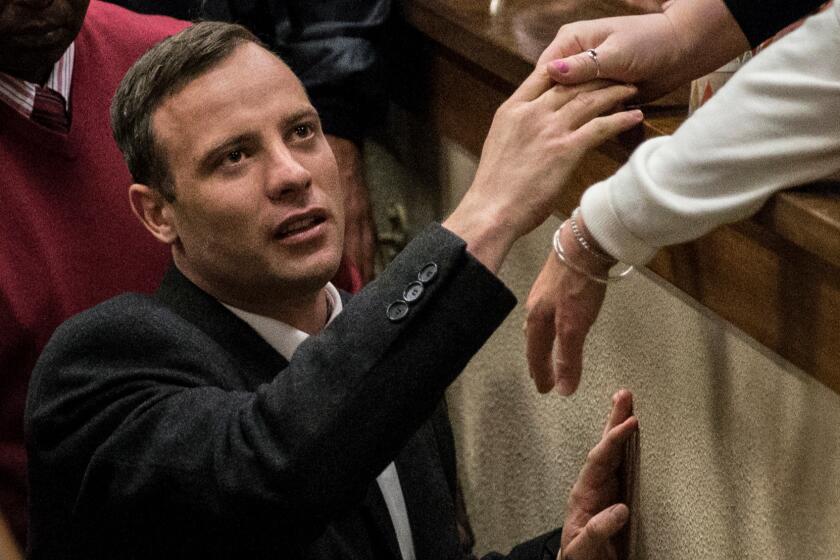South African runner Oscar Pistorius granted parole 10 years after killing his girlfriend

- Share via
PRETORIA, South Africa — Double-amputee Olympic runner Oscar Pistorius was granted parole Friday, 10 years after shooting his girlfriend through a bathroom door at his home in South Africa in a killing that made international headlines.
Department of Corrections spokesperson Singabakho Nxumalo said Pistorius would be released from prison Jan. 5. His parole will come with conditions, including that he not leave without official permission from the area of Pretoria where he is set to live. Pistorius will also attend a program to deal with his anger issues, Nxumalo said, and will have to perform community service.
Pistorius’ parole conditions will be in place for five years, the Department of Corrections said.
“Parole does not mean the end of the sentence. It is still part of the sentence. It only means the inmate will complete the sentence outside a correctional facility,” Nxumalo said.
Pistorius, who turned 37 this week, has been in jail since late 2014 for the Valentine’s Day 2013 killing of model Reeva Steenkamp, although he was released for a period of house arrest in 2015 while one of the numerous appeals in his case was heard. He was ultimately convicted of murder and sentenced to 13 years and five months in prison.
Serious offenders in South Africa must serve at least half of their sentence to be eligible for parole, which Pistorius has done.
Ten years ago, a young man turned up at a Pretoria athletic field and trotted around the track a few times with casual ease.
Pistorius was at the height of his fame and one of the world’s most-admired athletes when he killed Steenkamp. He shot her multiple times in the bathroom of his Pretoria villa in the predawn hours.
Friday’s parole hearing was Pistorius’ second in the space of eight months. He was wrongly ruled ineligible for early release at a first hearing in March. That was due to an error by an appeals court over when the sentence officially started.
Pistorius was initially convicted of culpable homicide — a charge comparable to manslaughter — for killing Steenkamp. That conviction was overturned, and he was convicted of murder after an appeal by prosecutors. They also appealed against an initial sentence of six years for murder, and Pistorius was ultimately given the sentence of 13 years and five months.
Pistorius testified at his murder trial that he killed Steenkamp by mistake, thinking she was a dangerous intruder hiding in his bathroom when he fired four times through the door with his licensed 9-millimeter pistol. Prosecutors argued that Steenkamp, a 29-year-old model and reality TV star, had fled to the toilet cubicle during a late-night argument and that Pistorius killed her in a rage.
Oscar Pistorius is a depressed, “broken man” who shouldn’t go back to prison for the murder of his girlfriend, a psychologist told Pretoria’s High Court on Monday at a sentencing hearing for the athlete, who is a double amputee.
Pistorius was eventually convicted of murder on a legal principle known as dolus eventualis, which means he acted with extreme recklessness and should have known that whoever was behind the door probably would be killed. It’s comparable to third-degree murder.
Steenkamp’s father, Barry Steenkamp, died in September. Her mother, June Steenkamp, did not oppose Pistorius’ parole.
Rob Matthews, whose 21-year-old daughter was slain in 2004 and who became a Steenkamp family friend, read a statement from June Steenkamp outside the prison before the hearing in which she said she was not opposing his parole and didn’t attend the hearing because “I simply cannot muster the energy to face him again at this stage.”
Nevertheless, “I do not believe Oscar’s version that he thought the person in the toilet was a burglar,” Steenkamp said. “In fact, I do not know anybody who does. My dearest child screamed for her life. ... I believe he knew it was Reeva.”
News Alerts
Get breaking news, investigations, analysis and more signature journalism from the Los Angeles Times in your inbox.
You may occasionally receive promotional content from the Los Angeles Times.
While out on parole, Pistorius is expected to live at his uncle’s mansion in a wealthy Pretoria suburb, where he stayed during his murder trial.
Pistorius was initially sent to Pretoria’s central prison, a notorious apartheid-era jail. He was moved to the city’s Atteridgeville Correctional Center in 2016.
There have been only occasional glimpses of Pistorius’ life behind bars over the last decade. His father has said he has been holding Bible classes for fellow prisoners, although there have also been flashes of trouble, including an altercation with another inmate over a prison telephone that left Pistorius in need of medical treatment.
Steenkamp’s killing happened just months after Pistorius had become the first double amputee to compete at the Olympics. He was also a multiple Paralympic sprinting champion and one of sports’ most marketable figures, having overcome the amputation of both his legs below the knee as a baby to run on specially designed carbon-fiber blades.
At his closely watched trial, prosecutors argued that there was another side to Pistorius’ life that involved guns and angry confrontations with others. Pistorius was also found guilty of a second charge of recklessly firing a gun in a restaurant.
More to Read
Sign up for Essential California
The most important California stories and recommendations in your inbox every morning.
You may occasionally receive promotional content from the Los Angeles Times.















